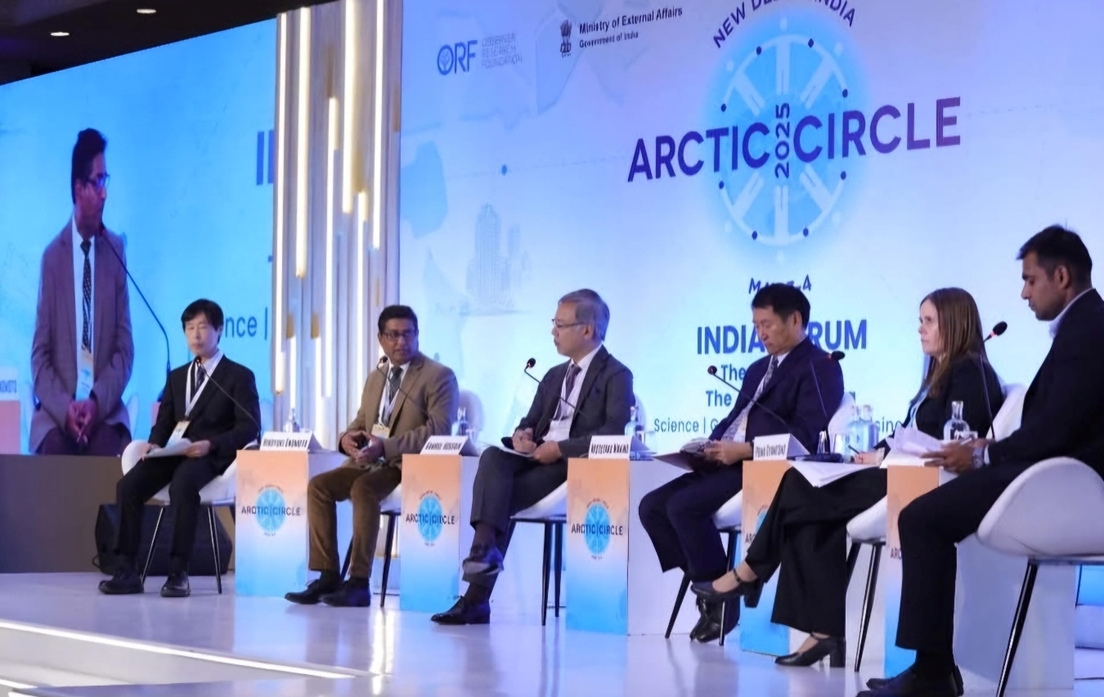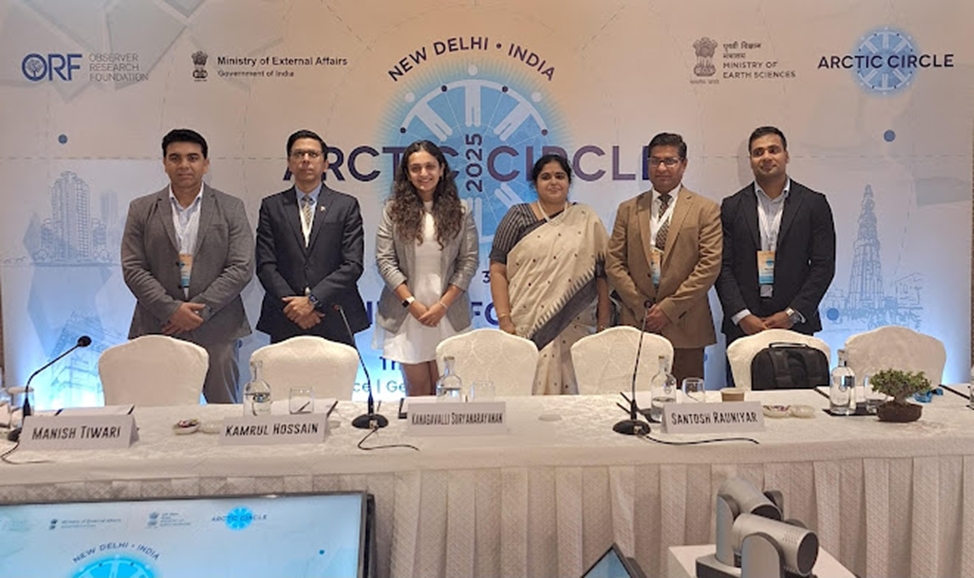News
News
Bridging the Poles: Interpolar Dialogue in the Himalayas and Arctic
2025.05.19
The Arctic Circle India Forum (May 2–4, 2025) marked a groundbreaking chapter in climate diplomacy by bringing the Arctic and the “Third Pole” – the Hindu Kush Himalaya – into direct conversation. In a plenary session titled “Interpolar Dialogue and the Himalayas/Third Pole: Strengthening Climate Governance and Policy Action in Cryosphere Regions,” leaders and experts from polar and mountain regions addressed the shared challenges of a warming cryosphere. This initiative builds on the Arctic Circle’s Polar Dialogue launched in 2024, which for the first time linked the Arctic, Antarctic, and Himalaya into a common platform. By extending this dialogue to South Asia, the forum underscored that impacts on the cryosphere are a collective human concern requiring unified global action.
The Interpolar Dialogue plenary brought together voices from the high north and the high mountains to explore collaborative governance in the face of accelerating ice melting and climate extremes. These distant regions, though geographically apart, share linked climate systems and common vulnerabilities. Crucially, the session emphasized that both the Arctic and the Himalayas are not just icy landscapes, but home to communities with intertwined futures – and the concept of an “interpolar dialogue” received significant support as a model for cross-regional learning and resilience planning.
Beyond science, speakers stressed the human and diplomatic dimensions of this partnership. Moderator Dr. Santosh Kumar Rauniyar described the Interpolar Dialogue initiative as establishing a “cryosphere corridor” – a bridge of cooperation linking the frozen realms of the Arctic and the Third Pole. He emphasized that “it’s not just diplomacy—it’s about building trust, respect, and the courage to listen across borders, cultures, and generations.” This credo set the tone for an open exchange among nations and generations. In the same spirit, Professor Mitsutaku Makino (President of OPRI-SPF, Japan) observed that climate-related disasters – whether Arctic wildfires or Himalayan glacial floods – are moments when humanity can unite in solidarity and mutual support. His point was that crisis can catalyze compassion, reminding us that shared vulnerabilities may bind communities across continents.
The Interpolar Dialogue plenary brought together voices from the high north and the high mountains to explore collaborative governance in the face of accelerating ice melting and climate extremes. These distant regions, though geographically apart, share linked climate systems and common vulnerabilities. Crucially, the session emphasized that both the Arctic and the Himalayas are not just icy landscapes, but home to communities with intertwined futures – and the concept of an “interpolar dialogue” received significant support as a model for cross-regional learning and resilience planning.
Beyond science, speakers stressed the human and diplomatic dimensions of this partnership. Moderator Dr. Santosh Kumar Rauniyar described the Interpolar Dialogue initiative as establishing a “cryosphere corridor” – a bridge of cooperation linking the frozen realms of the Arctic and the Third Pole. He emphasized that “it’s not just diplomacy—it’s about building trust, respect, and the courage to listen across borders, cultures, and generations.” This credo set the tone for an open exchange among nations and generations. In the same spirit, Professor Mitsutaku Makino (President of OPRI-SPF, Japan) observed that climate-related disasters – whether Arctic wildfires or Himalayan glacial floods – are moments when humanity can unite in solidarity and mutual support. His point was that crisis can catalyze compassion, reminding us that shared vulnerabilities may bind communities across continents.

Plenary Session: Interpolar Dialogue
(Speakers: from left to right: Prof. Hiroyuki Enomoto, Prof. Kamrul Hossain, Prof. Mitsutaku Makino, Dr. Pema Gyamtso, H.E. Katrín Jakobsdóttir, and Dr. Santosh Kumar Rauniyar (moderator))
H.E. Katrín Jakobsdóttir, Chair of the Polar Dialogue and former Prime Minister of Iceland, reinforced that inclusive governance is key to climate resilience. She reiterated the essential role of indigenous and local communities in shaping adaptation strategies and decision-making. From Arctic Sámi reindeer herders to Himalayan Sherpa communities, indigenous knowledge and leadership were acknowledged as indispensable for guiding climate action. H.E. Katrín’s emphasis on inclusivity echoed a broader principle: effective climate solutions must elevate those who live closest to the land. This approach aligns with Arctic Circle’s practice of including indigenous leaders alongside scientists and officials – a practice now extended through interpolar cooperation. By honoring cultural wisdom and local perspectives, the dialogue gains both legitimacy and creative solutions that top-down approaches might miss.
OPRI-SPF, through its Polar Studies Program, has played a catalytic role in building this bridge between the Himalayas and the polar regions. The program, active in both the Arctic and the Third Pole—seeks to foster science-policy integration, climate diplomacy, and international collaboration. The Third Pole Project, a core initiative under this program, embodies this mission by linking mountain cryosphere research with broader oceanic and climate systems. In line with these objectives, OPRI-SPF is also co-organizing the upcoming Second Interpolar Conference in Kathmandu and continues to contribute actively to Arctic-wide dialogues, including its participation in the Polar Dialogue session at the Arctic Circle Assembly in Reykjavík. These efforts reflect OPRI-SPF’s long-standing commitment to fostering inclusive and equitable climate governance across the world’s critical cryosphere regions.
Complementing the high-level dialogue, the forum also featured an Inter-polar knowledge exchange platform session. This initiative is envisioned as a practical network or “hub” for ongoing collaboration among polar and mountain stakeholders. Experts from ICIMOD (the Himalayan regional center) and the Sasakawa Peace Foundation (Japan), moderated by Dr. Kamrul Hossain of the Arctic Centre, University of Lapland, Finland, discussed ways to institutionalize scientific and policy exchanges between the Arctic and the Third Pole. Discussions ranged from sharing climate data and early warning systems to joint research projects, capacity building, and youth engagement across regions.
OPRI-SPF, through its Polar Studies Program, has played a catalytic role in building this bridge between the Himalayas and the polar regions. The program, active in both the Arctic and the Third Pole—seeks to foster science-policy integration, climate diplomacy, and international collaboration. The Third Pole Project, a core initiative under this program, embodies this mission by linking mountain cryosphere research with broader oceanic and climate systems. In line with these objectives, OPRI-SPF is also co-organizing the upcoming Second Interpolar Conference in Kathmandu and continues to contribute actively to Arctic-wide dialogues, including its participation in the Polar Dialogue session at the Arctic Circle Assembly in Reykjavík. These efforts reflect OPRI-SPF’s long-standing commitment to fostering inclusive and equitable climate governance across the world’s critical cryosphere regions.
Complementing the high-level dialogue, the forum also featured an Inter-polar knowledge exchange platform session. This initiative is envisioned as a practical network or “hub” for ongoing collaboration among polar and mountain stakeholders. Experts from ICIMOD (the Himalayan regional center) and the Sasakawa Peace Foundation (Japan), moderated by Dr. Kamrul Hossain of the Arctic Centre, University of Lapland, Finland, discussed ways to institutionalize scientific and policy exchanges between the Arctic and the Third Pole. Discussions ranged from sharing climate data and early warning systems to joint research projects, capacity building, and youth engagement across regions.

Session in parallel: An Interpolar Knowledge Exchange Platform.
(Speakers from left to right: Dr. Mohd. Farooq Azam, Dr. Manish Tiwari, Dr. Raushan Tara Jaswal, Prof. Kamrul Hossain (moderator), and Dr. Santosh Kumar Rauniyar)
A key takeaway was the resolve to turn dialogue into concrete partnerships. Participants stressed that sustained knowledge-sharing can help manage cryosphere risks – for example, applying Arctic disaster response lessons to Himalayan glacial lake floods, and vice versa. This platform essentially embodies the “cryosphere corridor” idea by ensuring that insights and innovations flow freely between the far north and the high mountains. As climate impacts accelerate, such structured exchange can significantly bolster regional capacity and mutual understanding.
Notably, this science-driven collaboration carries diplomatic weight. In an age of global tensions, trans-regional climate initiatives offer a hopeful counter-narrative. By focusing on shared concerns like disaster risk reduction and water security, countries can build bridges even when other issues divide them. This kind of scientific diplomacy was lauded at the forum as a way to “depolarize” international relations through a common climate cause.
The overarching message from both the plenary and the knowledge-exchange sessions was that interpolar cooperation transcends technical fixes – it is fundamentally about people, culture, and relationships. Key takeaways underscored this human-centric approach to the cryosphere crisis:
The Arctic Circle India Forum’s focus on the Himalayas/Third Pole alongside the Arctic has charted a new path for climate governance – one that is collaborative, inclusive, and mindful of our shared humanity. By forging this “cryosphere corridor” between the poles, the forum demonstrated diplomacy at its best: bridging not only geographic distances but also cultural and generational divides. The Interpolar Dialogue and the emerging knowledge exchange platform together signal a shift in how we tackle the cryosphere challenge. They remind us that whether atop the highest peaks or at the highest latitudes, our destinies under climate change are interconnected. With continued leadership from institutions like OPRI-SPF and initiatives such as the Polar Studies Program and the Third Pole Project, this interpolar momentum is poised to deliver not only meaningful partnerships, but real progress. Only through solidarity, mutual respect, and inclusive action can we build resilience in all cryosphere regions—and ensure no community is left out in the cold.
A video of the Interpolar Dialogue is now available on the Arctic Circle's official YouTube channel:
Interpolar Dialogue - YouTube
Notably, this science-driven collaboration carries diplomatic weight. In an age of global tensions, trans-regional climate initiatives offer a hopeful counter-narrative. By focusing on shared concerns like disaster risk reduction and water security, countries can build bridges even when other issues divide them. This kind of scientific diplomacy was lauded at the forum as a way to “depolarize” international relations through a common climate cause.
The overarching message from both the plenary and the knowledge-exchange sessions was that interpolar cooperation transcends technical fixes – it is fundamentally about people, culture, and relationships. Key takeaways underscored this human-centric approach to the cryosphere crisis:
- Solidarity in the face of crisis: As Prof. Makino noted, climate disasters in the Arctic or Himalaya are not distant events but a collective test of humanity’s capacity for mutual aid. Each flood or wildfire is a call for empathy across borders, reinforcing global solidarity in action.
- Trust and mutual respect beyond protocols: Dr. Rauniyar’s “cryosphere corridor” analogy encapsulates the idea that real progress comes from trust-building. Effective cooperation demands the courage to listen across cultures and generations, not just to sign agreements. Such intercultural respect forms the foundation for durable partnerships.
- Elevating indigenous and local voices: Echoing Chair Jakobsdóttir, including indigenous peoples and local communities is not a courtesy but a necessity. Their traditional knowledge, cultural heritage, and lived experience in ice-dependent regions offer invaluable insights for adaptation. Empowering these voices ensures climate policies are just and grounded in local reality.
The Arctic Circle India Forum’s focus on the Himalayas/Third Pole alongside the Arctic has charted a new path for climate governance – one that is collaborative, inclusive, and mindful of our shared humanity. By forging this “cryosphere corridor” between the poles, the forum demonstrated diplomacy at its best: bridging not only geographic distances but also cultural and generational divides. The Interpolar Dialogue and the emerging knowledge exchange platform together signal a shift in how we tackle the cryosphere challenge. They remind us that whether atop the highest peaks or at the highest latitudes, our destinies under climate change are interconnected. With continued leadership from institutions like OPRI-SPF and initiatives such as the Polar Studies Program and the Third Pole Project, this interpolar momentum is poised to deliver not only meaningful partnerships, but real progress. Only through solidarity, mutual respect, and inclusive action can we build resilience in all cryosphere regions—and ensure no community is left out in the cold.
A video of the Interpolar Dialogue is now available on the Arctic Circle's official YouTube channel:
Interpolar Dialogue - YouTube
(by Santosh Kumar Rauniyar, Ph.D., Research Fellow, OPRI/SPF)